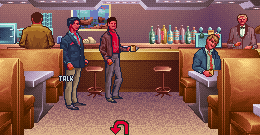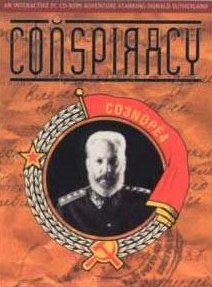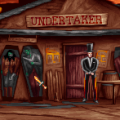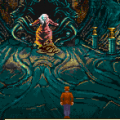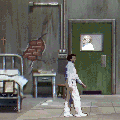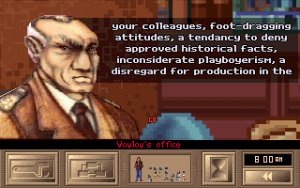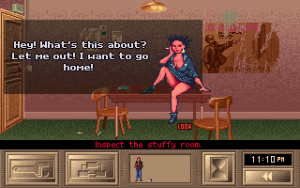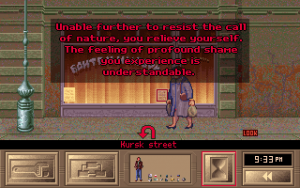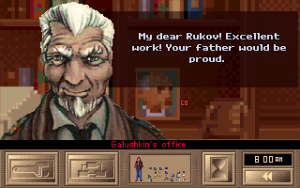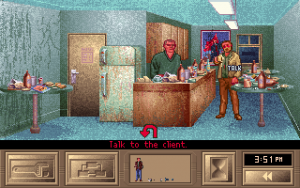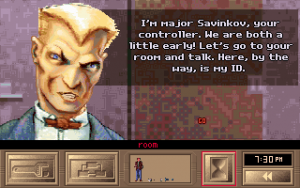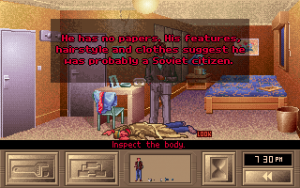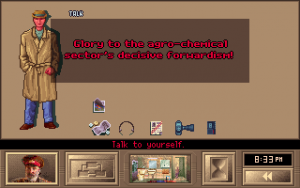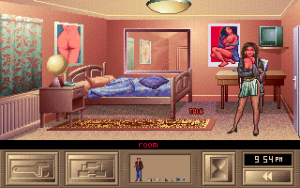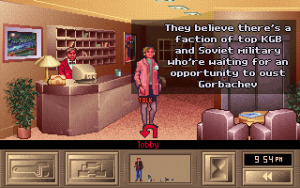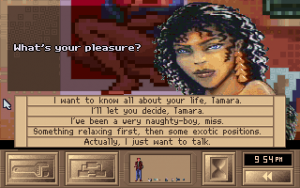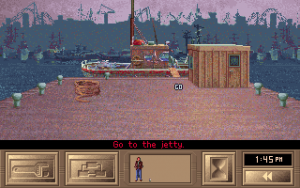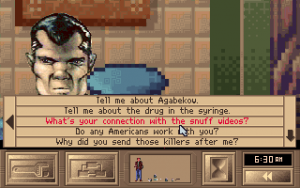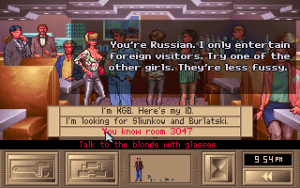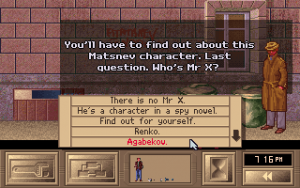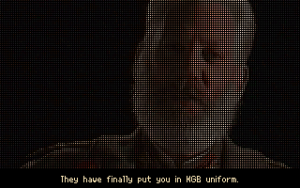Cryo’s KGB is a unique time capsule. Published in 1992 and taking place shortly before the collapse of the Soviet Union, KGB puts you in the shoes of one Captain Maksim Rukov, a former Spetnaz agent assigned to the Soviet secret service headquarters in Moscow. It’s your first day in Department P, whose job it is to stamp out corruption in the organization. Naturally, everyone else more or less hates you, because said corruption infests practically every layer. Your initial assignment is to investigate the murder of a private eye, whose previous ties with the KGB may have had something to do with his unfortunate demise. After infiltrating the ranks of the local mafia, you stumble upon an operation trafficking both snuff tapes and drugs, and become further embroiled in a mass conspiracy involving the CIA, a mysterious organization known as “New Birth”, and a plan to stage a coup against Premier Gorbachev… all of which somehow ties in with the eventual downfall of Soviet Communism.
The graphic adventure gaming canon is filled with games featuring instant deaths and dead end situations, but perhaps none are so unrelenting as KGB. There are countless ways to screw up your mission, either resulting in you getting killed, or perhaps worse, demoted and shipped off to some crappy job out in the middle of nowhere. Say the wrong thing in a conversation tree, it’s over. Get in a fight and pick the wrong person to attack, it’s over. Use unnecessary force, get taken off the case, and then it’s over. Some of these fail states are sudden, but the ways to fix them is usually obvious – more painful are the ones that aren’t so easily telegraphed. In the first chapter, you’re supposed to intercept a drug transaction, but you’re never told this unless you stumble upon it. If you missed it, it’ll come back to bite you in the ass later. The game also runs on a timer, as the minutes tick down when you run from location to location. If you miss an event, then, again, it’s over. It’s even strict when it comes down to completely silly things – you only have a limited supply of matches used to illuminate dark areas, and if you use them up too early, you are similarly screwed. At one point you are told to find a bathroom, but at least the game is kind enough to let you keep going if you accidentally piss yourself.
Traditional puzzles are sparse – beyond decoding messages or finding clever ways to dispose of dead bodies, most of the time is spent simply interrogating, trailing, or spying on other people. Gathering information is more important than gathering items, and at various points in the game you’re quizzed on what you’ve learned. If you don’t have the answer or answer incorrectly – well, you can probably guess what happens there, too. Most of the game can be navigated with a simple smart cursor, but an additional command menu will let you interact further, to move items between screens or hide behind scenery.
You are at least granted some level of leeway. There is an “undo” command when you die, but it only takes you back a little bit, potentially not far enough to have any real consequence. Most skilled adventure gamers get around this through save scumming, but there’s but a mere four save slots. And while you can elect to restart the game at the beginning of any of the four chapters rather than starting from scratch, the first two chapters are quite long, so you’ll still need to retrace a lot of ground. Everything about KGB is remarkably cold and calculating to the point where it simply exudes hostility. While insanely frustrating, it does a fascinating job of invoking the kind of paranoia within the Soviet Union or any oppressive government, where an off-color anti-government joke could send you to a stint in the gulag.
The dialogue is similarly frigid. Everyone talks in a very blunt, straightforward manner, perhaps to communicate how English speakers hear Russians, without resorting to goofy Yakov Smirnoff speech. The font is the same as the one used in LucasArts games, its friendliness betraying the harshness of the words. Many characters are non-essential but can be spoken to regarding important topics such as the political and economical situations, or less important dealings like information on the local nightlife and the attractiveness of the local female population. They all have their own opinions, some afraid of the destructive values of Western society, others wary of political upheaval, still others finding ways to rationalize their criminal deeds. You can ask practically everyone for a drink or a cigarette – in turn, you can admonish some of your fellow workers for their opulence. Functionally, very little of it matters – different dialogue choices can have the same exact outcome, or potentially no outcome at all – but it does lend to the illusion of a richly populated game world. Some of it is also a bit tongue-in-cheek, like the propaganda phrases you spout if you attempt to talk to yourself. “Strive strenuously for historic upswings!” “Root out parasitic negativism!” “Toil unerringly in line with correct norms!” Try to shoot yourself, and you’re told “This is outrageous! Are you determined to liquidate a state official without the necessary authorisation?” You can then choose from the options, “You waste a human resource.” or “You wait for official authorisation.” The former is a quick way to the Game Over screen, of course. Such off-color gags relax the atmosphere, slightly, and are quite welcome.
KGB presents a dense, complicated mystery – there are at least a dozen characters central to the plot, and numerous others. Some are members of the KGB, CIA, various mafia factions, or are simply civilians. Since there are so many of them with various allegiances, it gets tough to sort them all out, especially with all of the Russian surnames. The game also assumes you have some knowledge of the political climate at the time – in other words, you’d best understand what perestroika, glasnost, and chekists are, or else you might find yourself somewhat confused. The climax doesn’t quite pay off as well as it should because the ending is somewhat hurried, but there are few games – outside of perhaps Gabriel Knight or The Longest Journey, both released years after KGB – that present this type of depth. The work is, of course, entirely fictional, and shouldn’t be taken too seriously as any type of political statement. It was, after all, developed in France rather than in Russia itself, but that does not undermine the rest of its qualities.
Stéphane Picq, who worked on Cryo’s other games, provides the electronica soundtrack, which is completely and utterly fantastic. Alternatively eerie and exciting, darkly moody and eminently danceable, it has no right to work given the intensely serious setting, but it somehow comes together. There are approximately six songs that simply play on loop throughout the whole game – in other words, the music doesn’t change based on the setting – but each track is excellent nonetheless. The Amiga version has the slight edge when it comes to sound quality, but the Adlib FM soundtrack in the PC version is surprisingly well adapted. Combined with the idiosyncrasies of the game’s visual and interface design – the creepy way characters warp in and out of rooms, the strange, hand drawn character portraits that clash with the pixel artwork backgrounds, the general cesspool that comprises the underground elements of Moscow and Leningrad, the fact that there’s a portrait of Lenin in practically every room – KGB creates an uniquely entrancing atmosphere, one that works in tandem with the daunting expectations of both the plot and the gameplay.
KGB is also subject to the most bizarre CD-ROM port ever made. Unlike most other similar games, they did not add any voices or redbook music – perhaps there was too much dialogue, anyway. Instead, they drafted actor Donald Sutherland, dressed him up as a Soviet, and cast him as the ghost of your character’s father. Effectively acting as a hint system, you can call him up at any time to get a bit of advice.
It’s a fundamentally ridiculous concept, not only because the FMV completely clashes with the rest of the aesthetics (and is extremely low resolution video blown up to full screen) but because it’s a strangely supernatural function in a game otherwise grounded in reality. They even changed the name, from KGB to Conspiracy: Starring Donald Sutherland. Despite the fact that it’s tacked on and terribly inappropriate, it actually does end up helping the game in the long run, because the guidance is practically necessary to get anywhere without an external walkthrough. Sometimes he’ll give some hints, sometimes he’ll spell out a solution completely, and he’s even kind enough to let you know if you’ve entered a walking dead situation. It’s clearly a poorly thought out bandage applied to an obtusely complicated game, but in the end, it kind of works.
